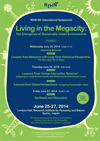RIHN 9th International Symposium
Living in the Megacity:
The Emergence of Sustainable Urban Environments
| Date: | June 25 - 27, 2014 |
| Venue: | Lecture Hall, Research Institute for Humanity and Nature (RIHN) (→ Access) |
| Organizer: | Research Institute for Humanity and Nature |
| Language: | English (simultaneous interpretation provided) |
| Participation: | Contact the address shown in the bottom of this page |
| Flyer: |

|
Symposium Outline:
Background
In 2008 it became evident that over half of the world’s population resided in urban settings. Taken together with growing awareness of the over-consumption of resources by city residents and serious damage on the global environment as a result of carbon dioxide emissions, the news was shocking to many. The rapid economic growth of two of the most populated nations in the world, China and India, is also a big concern. While the media tend to emphasize the negative impacts of urban life ways on the global environment, we need to remember that many residents in megacities, especially in developing countries, live in poverty. These individuals are vulnerable to the results of climate change, such as resource depletion, flooding and sea level rise. Megacity residents are the first to be impacted by both global and local environmental problems, even as they receive significant social and economic benefits from urban life.
RIHN Megacity Project
Eighteen cities in the world now have a population of more than ten million people. Most of them are located in developing countries in tropical or temperate zones. These cities have created unprecedentedly intricate patterns of human-environmental interaction, each having massive influence on other cities and on the global environment. The Research Institute for Humanity and Nature (RIHN), Kyoto, Japan, is a home for a wide range of trans-disciplinary projects conducted in order to understand mutual relationships between humans and environments. Among them is the RIHN Megacity Project that began in 2009. Focusing on Jakarta, one of the 18 megacities, this six-year research project has mobilized approximately 100 researchers with diverse fields, including sciences, history and other social sciences and engineering, to identify how to mitigate global environmental problems while improving the quality of local peoples’ lives.
Main Theme and Symposium Outline
Building upon Megacity Project findings, this symposium brings together prominent scholars from around the world to discuss how large cities can become sustainable. The main theme of this international symposium is the prospect of sustainable Megacity futures, with a focus on intra- and inter-city diversity. This symposium consists of three sessions. Focusing on the causes, conditions, and consequences of the growth and decline of past cities and cultures, the first session aims to identify aspects of urban resilience from a historical perspective. The second session engages in an interdisciplinary discussion on the ways in which cities and non-cities can coexist through various partnerships. Discussion of the third session revolves around the definitions of sustainable cities as well as the question of how to evaluate their sustainability, through which we present future visions of desirable cities.
Life in the Megacity
Our belief is that living wisely in a megacity could become one of the most important dimensions of sustainability in the global environment. Such lifeways are not immediately self-evident, however. They must be discovered based on the wisdom of the past and discussion of urban-rural coexistence. The ultimate goal of the symposium is to work together to find a philosophy for living wisely in megacities, one which will encourage the future prosperity of humanity and its coexistence with the global environment.
- Opening Session
- Session 1 Lessons from Research with Long-Term Historical Perspective: The Rise and Fall of Cities
- Session 2 Lessons from “Urban Interaction Spheres”: Adapting to Local Environments and Reducing Environmental Loads
- Session 3 Lessons from Global Perspectives: Designing Sustainable Cities
- Session 4 Synthesis and Discussion
→ Go to Program (You can download abstract)
Contact:
International Affairs Subsection
Tel: +81-75-707-2152
Fax: +81-75-707-2106
E-mail:

